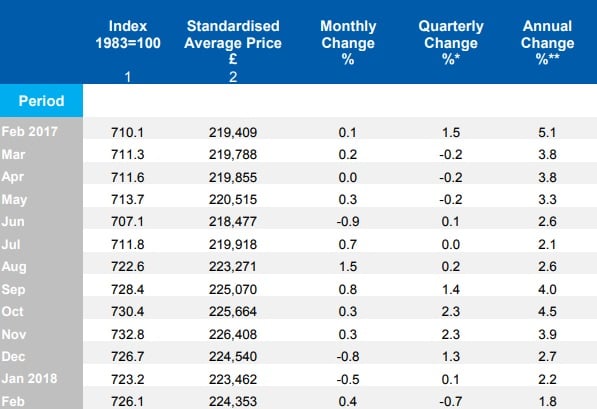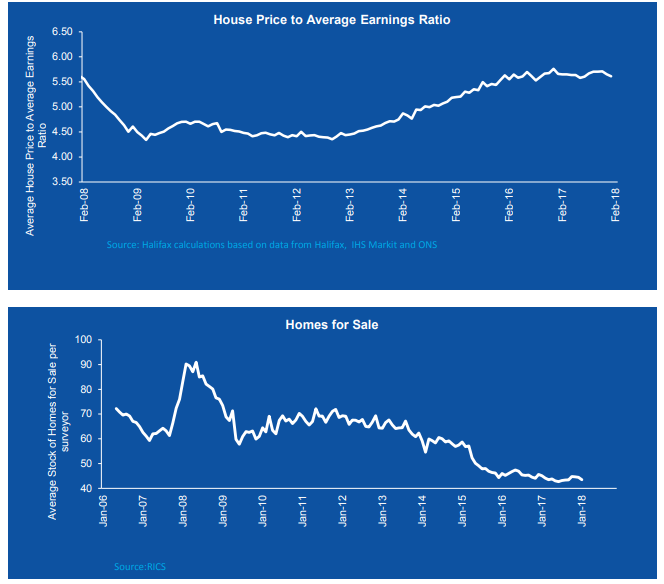Halifax Data Show UK Housing Market Transactions Steady while Prices Slow in February
- Written by: James Skinner

© IRStone, Adobe Stock
“The lack of new instructions coming to market continues to impede activity and new instructions have now fallen for 23 consecutive months – the worst sequence since 2007- 2009.”
UK house price growth continued to wane in the three months to the end of February, according to the latest Halifax Bank of Scotland house price index, even as the number of completed transaction remained close to post-crisis highs.
House prices rose 0.4% to £224,353 in February alone but were down 0.7% when the three months to the end of February are compared with figures for the previous quarter.
Moreover, house prices were up just 1.8% when February’s numbers are compared with those of the same period one year ago. This is down from the 5.1% growth seen in the year to February 2017 and the slowest pace of annual price growth since March 2013.
February’s house price slowdown came despite completed transaction volumes remaining above the 100,000 threshold which, consistent with transaction volumes of 1.2 million per year, is in line with the post-crisis peak seen during the 2013 to 2018 years.
“On the ground, buyers know they're in a strong position and are making lower offers and negotiating harder with sellers. And there are plenty of sellers who are recognising that prices have cooled a little and are willing to negotiate with buyers,” says Sam Mitchell, CEO of online estate agents HouseSimple.
“That's a much healthier position than having a stand off between buyers and sellers because no-one wants to budge on price."

Above: Halifax House Price Data.
Despite continued high levels of completed transactions, Halifax flags that indicators of housing demand and supply are weak, with the number of new buyer enquiries falling for the tenth month in a row during February.
New instructions to estate agents have also fallen, although by a longer period of 23 consecutive months, suggesting both buyers and sellers may soon dwindle in their numbers.
“The lack of new instructions coming to market continues to impede activity and new instructions have now fallen for 23 consecutive months – the worst sequence since 2007- 2009,” Halifax says in its report.
Halifax data comes just ahead of the Royal Institute for Chartered Surveyors report for the recent month and just days after Nationwide Building Society announced that its own measure of national house prices had slipped by 0.3% in February.
Nationwide said house prices were down in February and the rate of growth covering the three months to the end of February was 2.2%, slower than the 3.2% seen in the previous period.
“Mortgage approvals declined to their weakest level for three years in December, at just 61,000. Activity around the year end can often be volatile, but the weak reading comes off the back of subdued activity in October and November. Surveyors report that new buyer enquiries have remained soft in recent month,” says Robert Gardner, chief economist at Nationwide.

Above: Halifax House Price Data.
The stall in house prices may be welcome news for first time buyers who, with house prices at more than five times average earnings, may be struggling to get on the ladder.
In 2014, the Bank of England said it would crack down on banks who are lending mortgage borrowers amounts that are greater than 4.5 times their annual income.
Despite the filip for first time buyers, slower price growth and the threat of falling transaction volumes will do little to lift sentiment toward the UK economy, which has been awash with gloomy news of late.
Moreover, with the Bank of England expected to raise interest rates in the year ahead, there appears plenty of scope for housing market activity to cool further in 2018. The BoE already raised rates for the first time in a decade back in November, taking the base rate up 25 basis points to 0.5%.
“Despite the November rise in the Bank of England Base Rate, mortgage rates continue to stay low by historical standards,” says Russell Galley, a managing director at Halifax.
"While we expect price growth to remain low, the low mortgage rate environment, combined with an ongoing shortage of properties for sale, should continue to support house prices over the coming months."
Advertisement
Get up to 5% more foreign exchange by using a specialist provider to get closer to the real market rate and avoid the gaping spreads charged by your bank when providing currency. Learn more here.



